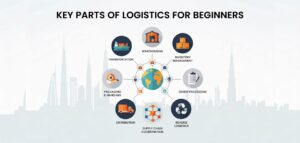When we hear the term logistics for beginners, it may sound technical at first, but it’s really about how things move from one place to another in a simple, planned way. It covers the planning, movement, and management of goods, making sure the right items reach the right place, at the right time.
As we type this for our new members, it reminds us that logistics starts with small human steps: decisions, timing, and clear planning. This guide is written by Alliance Shipping, a leading logistic company in Dubai, so anyone new to the topic can understand logistics for beginners and how it connects to businesses.
Understanding Logistics in 2025
Let’s start with a clear meaning. Logistics for beginners means learning how cargo moves from one point (origin) to another (destination), i.e., from the maker to the user. It covers every detail between these two points: storage, packing, shipping, customs, and delivery.
Think of it as a journey a product takes. First, someone stores it in a warehouse. Then, it’s packed, labeled, and moved using a truck, ship, or plane. Finally, it reaches the person who needs it. All these steps are planned, tracked, and improved to save time and cost.
For beginners, logistics is easier to understand when you imagine each part as a simple handoff. One person passes the parcel to another warehouse to transport, transport to customs, customs to the customer. Every handoff needs timing, care, and coordination. That’s logistics in its simplest form – but at Alliance Shipping, we aren’t primarily focusing on small parcels but large-scale shipments.
When companies manage this process well, deliveries arrive faster, costs stay low, and customers are satisfied. Even small online sellers use basic logistics when they plan how to pack, label, and ship their orders on time.
Why Learning Logistics Is Important for Beginners
In business, understanding logistics for beginners helps you see the bigger picture behind every delivery. It’s not just moving a box, it’s managing time, cost, and trust. A small delay in one step can affect the whole chain. Learning logistics helps beginners notice these details early.
For example, in e-commerce logistics Dubai, fast and organized delivery keeps customers happy and helps brands grow. The same is true worldwide, good logistics builds a business’s reputation and saves money.
Understanding basic logistics also helps you make better decisions. You’ll know when to ship by air for speed, or by sea to save cost. You’ll know how to plan storage and handle returns. For beginners, learning this step-by-step approach builds confidence and helps in any role, from warehouse worker to business owner.
When our team first learned about logistics, they found that writing down each step in order helped them see where things could go wrong. A beginner can do the same, sketch the flow of goods and check what each part needs: documents, packing, space, or time. That’s how understanding starts.
Key Parts of Logistics for Beginners

A simple way to learn logistics is to break the entire process down into a few parts:
1. Transportation
This is how cargo moves – air, sea, or land. Beginners should learn that choosing the right mode depends on speed, cost, and distance. For example, international shipping from Dubai often uses sea freight for heavy goods and air freight for urgent ones.
2. Warehousing
Before goods are shipped, they need safe storage. Warehouses organize, track, and prepare items for delivery. Beginners can visit a warehouse or see a small stockroom to understand how labeling and order picking work.
3. Inventory Management
Keeping the right amount of stock is key. Too much stock means wasted space, and too little means missed sales. For beginners, using simple inventory lists or software can help track what’s in and out.
4. Packaging
Good packaging protects goods and saves space in trucks or containers. Beginners can practice by learning how to measure, pack, and label boxes clearly.
5. Customs and Documentation
When goods cross borders, they need documents and checks. Beginners should learn the basics of customs rules and how paperwork helps avoid delays.
These parts work together like a team. Even beginners can start small, with simple steps like organizing packing materials or checking tracking numbers. Each action connects to a bigger system.
Common Challenges in Logistics for Beginners

Beginners often face a few simple but real challenges:
- Delays due to poor planning or missing documents.
- Wrong labeling, which sends packages to the wrong place.
- Inventory errors; running out of stock or having too much.
- Communication gaps between teams.
Learning logistics is about solving these problems calmly. Keep lists, use clear labels, and double-check addresses. These simple habits build a solid foundation.
In Dubai, where logistics runs fast due to high trade volumes, even small mistakes can slow things down. That’s why beginners should learn to stay organized, follow checklists, and communicate clearly.
How Beginners Can Learn Logistics Easily
To learn logistics for beginners, start with simple daily examples. Watch how online orders move, how you receive tracking messages, delivery updates, and estimated times. These are all part of logistics.
You can also take short online courses, visit Alliance Shipping, a reputable logistics company in Dubai, or talk to professionals who handle shipments. Many logistics companies offer simple tours or training programs. Observing real operations makes learning faster and clearer.
For practice, beginners can try basic exercises:
- Plan a delivery route on a map.
- List what’s needed to send a small package abroad.
- Compare the time and cost of air vs. sea freight.
Small exercises like these build understanding without stress. Over time, beginners learn how each part of logistics connects.
Sustainable Tips for Beginners in Logistics
Sustainability is becoming an important part of modern logistics. Beginners should learn how to save energy and reduce waste early on.
Simple habits make a difference:
- Use the right box size to reduce wasted space.
- Combine shipments to save fuel.
- Choose eco-friendly materials for packing.
- Plan routes to avoid empty trips.
Final Thoughts on Logistics for Beginners
Learning logistics for beginners is like learning a simple system that keeps the world moving. Every cargo commodity, from electronics to furniture, travels through a chain of people, steps, and ideas. Understanding how that chain works helps you become more skilled in business and daily life.
If you’re looking for real-world examples, you can check out Alliance Shipping, one of the leading logistics companies in Dubai. Watch how we handle customs, warehousing, and delivery. It brings the theory to life.
For beginners, starting simple is the key. Step by step, you’ll see how logistics connects everything, smoothly and smartly.






















